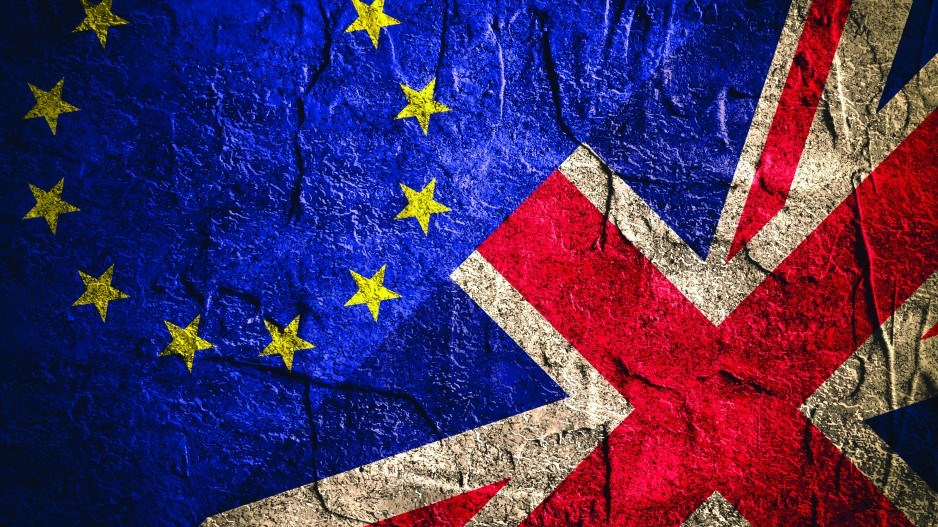But the anti-free trade, anti-globalization sentiment behind Brexit is not confined to the U.K., and it could bode ill for other trade liberalization pacts like the Trans-Pacific Partnership (TPP), say a number of economists and political scientists.
Populist politicians in the U.K. and U.S. have tapped into a wellspring of disaffection with free trade, economic co-operation, globalization and unelected quasi-governmental bodies, from the EU to the G20 and International Monetary Fund.
“Global momentum in favour of trade liberalization has ebbed very visibly over the past few years,” said Jock Finlayson, executive vice-president and chief policy officer for the Business Council of BC (BCBC).
“The challenge is not going to be advancing trade liberalization; it’s going to be preventing and forestalling a potential descent into a protectionist kind of spiral. That is the real risk that we’re facing.”
James Brander, an economist specializing in international trade at the University of British Columbia’s (UBC) Sauder School of Business, agrees. Anti-free-trade sentiment is growing among some of Canada’s major trading partners – notably the U.S.
“What I think gets lost is that there are different parts of the globalization phenomenon.”
The EU is the world’s largest trading bloc. But it’s much more than just a free trade arrangement. The EU sets policies that guide the 28 members’ domestic policies on everything from banking and finance to immigration and human rights law.
A major sore point for EU opponents in Britain has been immigration, Brander said. As part of its EU membership, the U.K. has seen mass migrations from eastern European countries and, more recently, from the Middle East and North Africa.
More generally, though, there is a feeling that unelected bureaucrats from Brussels dictate British economic, legal and social policy.
“It has to do with people feeling they have no control,” said Allan Craigie, a UBC political scientist specializing in British and Canadian politics. “If you look at the EU, it’s impossible to take away from the simple fact that it is a giant bureaucracy.”
Similar anti-free-trade and anti-globalization sentiment has taken mainstream root in the U.S. as well. Once largely a cause of the left, it has become more broadly spread across the political spectrum, as certain sectors of the economy are sacrificed to open competition.
“If we think back about 20 years ago, and the promise of globalization, part of it was to free up the markets and to allow the free movement of goods and people for the benefit of the global economy,” Craigie said. “And I think we’ve seen that, by and large. But that didn’t take into account that some people are left behind. So along come the Brexiters, the Donald Trumps, the Bernie Sanders that say we need to stop this, we need to bring some common sense back. That’s a really easy argument for people to latch onto because people have real concerns that they can’t put food on the table for their children.”
Trump has used the same word – “disaster” – to describe the TPP and the North American Free Trade Agreement (NAFTA) and has vowed to renegotiate the latter if he is elected president.
Brander doesn’t think existing agreements like NAFTA are going to be rewritten. But he does think the TPP could be in trouble.
Finlayson agreed. He said the TPP is “as good as dead.” Democratic presidential candidate Hillary Clinton has officially said she doesn’t support the TPP either.
“It appears that American politics have effectively killed the TPP,” Finlayson said.
It’s not clear whether the federal Liberal government would ratify the TPP. If it does, it might be signing onto a deal that lacks one of the country’s most important trading partners.
“If the TPP doesn’t go ahead with the 12 members, there could be the possibility that Canada and the other 10 signatories could go ahead without the U.S.,” Finlayson said.
One other trade agreement Canada has signed, but which is not yet ratified, is the Canada and European Union Comprehensive Economic and Trade Agreement (CETA).
Economists like Finlayson think that the U.K.’s exit from the EU could put that agreement in question as well.
“I think the prospects that CETA would be ratified and implemented would diminish in the event that the European Union is thrown into turmoil because the second-largest member state [had] decided to exit.”




